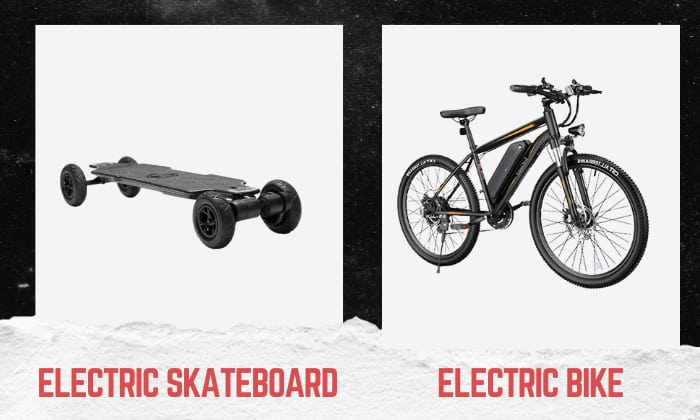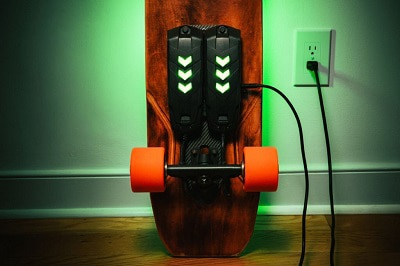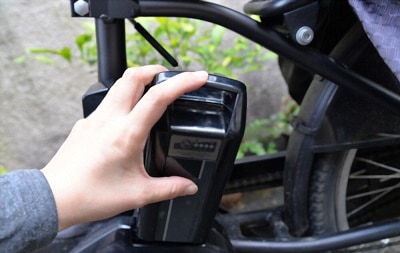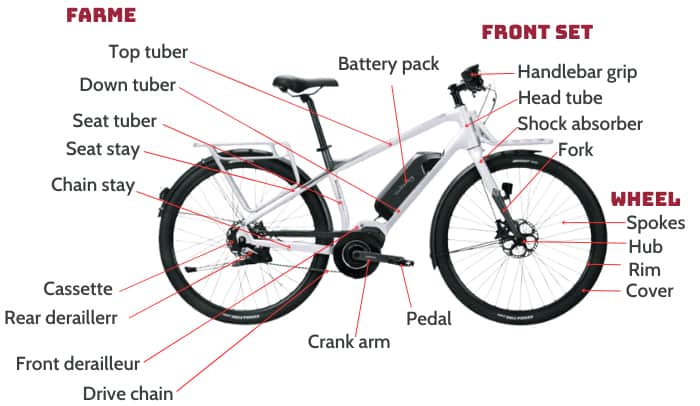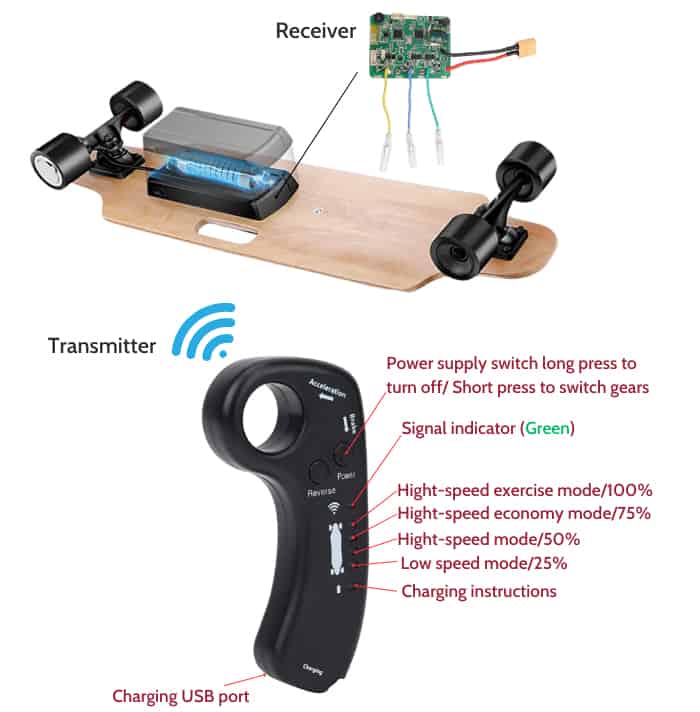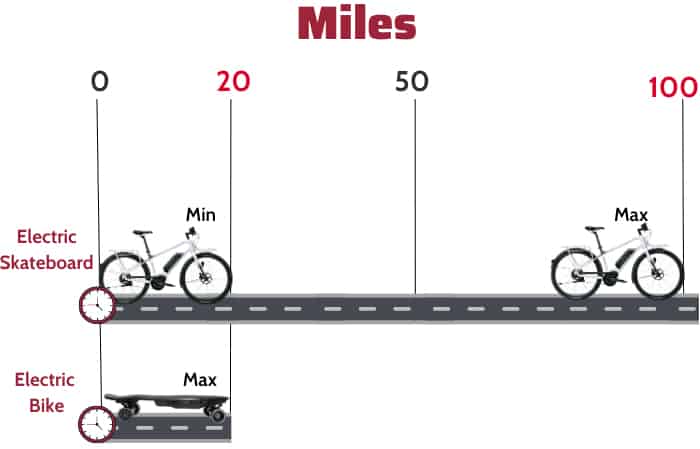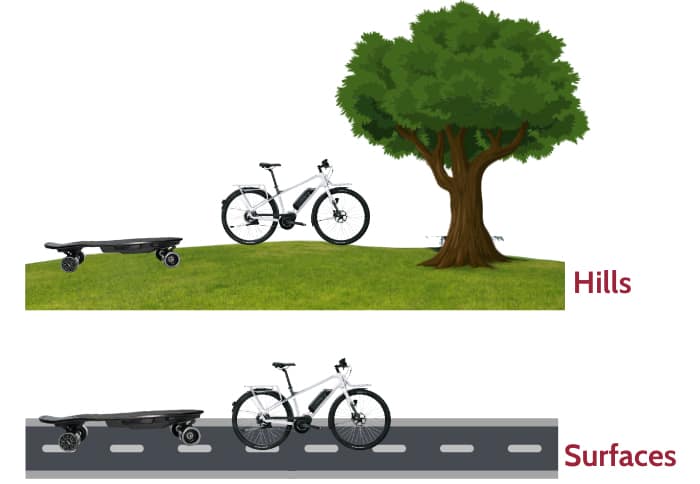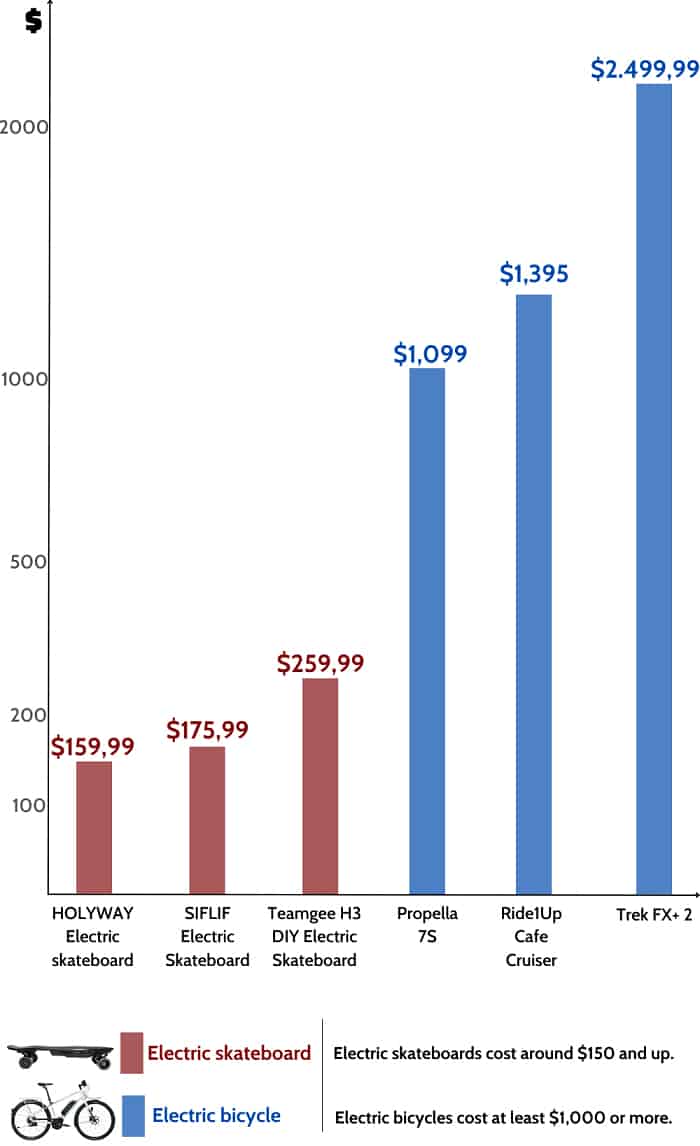In recent years, we have come up with the idea of commuting without fuel consumption. Hence, electric cars and similar vehicles began to surface. Also joining this trend are two of our favorite outdoor vehicles: skateboards and bicycles.
So, electric skateboard VS electric bike: which equipment is better to use? What setups fit them best? And how are these electronic vehicles different?
Keep reading this article as we answer all these questions. We will also compare and analyze their features to help you identify the better device overall.
| Area of comparison | Electric Skateboards | Electric Bicycles |
| Added parts from basic variants | Bluetooth receiver and transmitter with remote control, motors, batteries, and ESC | Sensor, batteries, motors |
| Top speed | 25mph | 28mph |
| Range | 20 miles | 20 to 100 miles |
| Terrain | Flat surfaces, hills, sidewalks, and some skate park areas | Flat surfaces, roads, and biking trails |
| Prices | Around $200 and up | At least $1,000 or higher |
Table of Contents
Electric Skateboards and Bikes: What Are They?
It’s easy to get invested in the idea of batteries and wiring incorporated into skateboards and bikes. But what are these setups like?
1. Electric skateboard
Electric skateboards contain the same parts as their regular counterparts, such as wheels, decks, and trucks. However, we have to add the following.
- Batteries
- Remote controller
- Motors
- Bluetooth receiver and transmitter
- Electronic Speed Controller (ESC)
These skateboards often operate without needing physical effort from the feet. That means pushing happens only when the battery runs out. The operation becomes smoother because the skater only drives the board through a hand-held remote device.
You’ll find both regular and off-road versions of this product. The latter is often a fat tire electric skateboard with bigger motors that can handle rough terrains better.
2. Electric bicycle
Like skateboards, e-bicycles reduce the mechanical and physical work of the user. And such a thing is possible because of these parts.
- Battery
- Sensor
- Motors
The battery empowers the whole electronic mechanism of the bike. The sensor ignites the motors to work.
And the motor, often in the bicycle’s frame, does all the magic in regulating the bike’s speed and power.
While many say pedaling is the essence of bicycle usage, why not add more speed and power with an e-bike?
How Does an Electric Bike or Skateboard Work?
Electric bikes are not like motorcycles. They are still the two-wheeled vehicles you used to ride with balancers when you were young.
These bikes still have handlebars, pedals, and brakes. However, compared to regular bicycles, these electric vehicles have the assistance of electrical components.
It all begins with the rider’s pedaling motion. The sensor grasps the movement and sends signals to the motors to work. And, of course, the batteries supply power for the bike’s motors and sensor.
How does electric skateboard work? It depends more on the remote controller, which dictates speed, braking, and other functions.
Once the skateboarder employs these movements with the remote, the battery will supply the needed power by the motors. From there, the mini engines of the e-skateboard spin the wheels.
Differences Between Electric Skateboards and Electric Bicycles
Both these electronic recreational devices provide speed and power. But there’ll be noticeable differences once we consider the following aspects.
1. Parts
You must have noticed that e-skateboards have more electronic components than e-bikes. And these differences rest on the ESC and Bluetooth receiver.
The Bluetooth receiver is crucial in receiving wireless signals from the remote control. And whatever instruction the skater gives through the controlling device, the ESC or Electronic Speed Controller helps implement it. It regulates the power running from the battery to the motor.
On the other hand, electronic bicycles are also unique in their sensors. Why does an e-bike have a sensor?
The sensor is an innovative addition to the e-bicycle. Yes, the user begins each e-bike ride by pedaling. But as soon as he obtains momentum, the sensors start their work as they activate the motors.
The motor does not spin the bike’s wheels but will assist the skater by adding more power to the motions.
2. Speed
For someone who is buying e-boards and bikes, speed is a significant consideration. So, between these wheeled devices, which is faster?
The electric bicycle’s motors alone can assist the biker by as much as 20-28 mph.
Now, how fast does an electric skateboard go?
Surprisingly, the fastest e skateboard has a top speed of 25 mph, not too far from a bicycle’s. However, some brands can only reach as much as 10 mph. Nonetheless, it’s already a fast electric longboard at that rate.
3. Range
Whether riding for college or some errands, the range is one area that distinguishes e-skateboards and e-bikes significantly.
Electric bikes can travel the shortest at 20 miles but can reach 100 miles under favorable conditions. But again, the numbers can still change depending on factors like the cyclist’s weight, road type, and batteries used.
Unfortunately, e-skateboards can only reach 20 miles after every charge. But like their bicycle counterparts, the number could still change based on relevant factors.
4. Terrain
It could be easy to pick between an e-skate or an e-bike without considering the terrain you plan to take. Unfortunately, things don’t work like that. Both these devices have limitations in this aspect.
Let’s begin with the common areas. Electric bicycles and skateboards can take on flat surfaces, roads, and hills.
However, e-skateboards work better on sidewalks and skateboard-dedicated spots like skate park areas, while electric bicycles are better for biking trails.
5. Portability
It’s easy to conclude based on their appearances alone that e-boards are more portable than e-bikes. This advantage is further compounded if you buy a folding electric skateboard, which can fit in bags and cases easily.
Pros and Cons
Let’s highlight the best and not-so-desirable things about e-skateboards and e-bicycles in this table.
| Electric Skateboard Pros | Electric Skateboard Cons | Electric Bicycle Pros | Electric Bicycle Cons |
| Superior portability | Limited weight capacity (up to 330 pounds) | More powerful than regular bikes | Longer charging time |
| Works for beginners | Costly | No fuel consumption and environment-friendly | Slightly more costly than e-skateboards |
| Reasonably fast | Vulnerable to damage from wearing and weather | More efficient for commuting | Less portable than skateboards |
| Operated with a remote controller | Better speed and distance than skateboards. Can hold more weight (up to 350 pounds) |
Cost of Electric Skateboard and Electric Bicycle
These wheeled recreational devices are all fun and fast until we realize they can be slightly costly. Here are some of today’s e-bike and e-skate prices.
Electric skateboard
- HOLYWAY Electric skateboard – $159.99
- SIFLIF Electric Skateboard – $175.99
- Teamgee H3 DIY Electric Skateboard – $259.99
Electric bicycle
- Propella 7S – $1,099.00
- Ride1Up Cafe Cruiser – $1,395.00
- Trek FX+ 2 – $2,499.99
Frequently Asked Questions
Which is better to buy, an electric skateboard or an electric bike?
Planning to ride a electric skateboard or bike?
As buyers, we should always consider the factors tackled above. We can choose an electric bicycle if we want a traveling device that runs long and fast.
Otherwise, if you want the convenience of not having to pedal, the remote-control-powered electric skateboard could be your best choice. These portable e-boards also have fewer restrictions on where you can bring them.
How long do electric skateboards last?
Many would claim that an electric skateboard’s lifespan depends on its usage, terrain, and other relevant factors. While it could be true, let’s tackle this aspect in controllable areas, such as the motors and batteries.
The batteries of an e-skateboard last an average of 3-5 years. For the motor, expect to get 3,000 to 5,000 miles out of it with regular inspection. The wheels may need replacement after six months to two years, while the trucks might survive as long as the battery.
Is Beast’s electric bike good?
The Beast Electric Bike is one of the options offering promising performance and quality. Beast ensures that all these wheeled devices undergo safety checking before selling them.
Besides electric bikes, Beast also offers a wide array of recreational vehicles. These include electric mountain bikes, road bikes, scooters or electric skateboard with handlebars, accessories, and more.
Conclusion
Admittedly, technology has brought us more things to enjoy. If we once relished in using regular skateboards and bicycles, how much more with their powered versions?
This electric skateboard VS electric bike comparison is simply a guide to help you pick between these exciting recreational devices. E-skateboards work without pushing, while e-bicycles roll better with added support from their motors and batteries.
Let this guide assist us in choosing what works best. Only then can we appreciate what we have invested in and paid for. If one thing is for sure, we’ll enjoy both of these products.

Hi, I am Charles Harris. I opened this site to write as much as I can about my biggest passion – skateboarding!
I started as a clumsy yet passionate rookie 10 years ago to now a still passionate yet much better skateboarder! But I have to tell you, the whole journey has always been fun and rewarding, indeed not without hardship.


